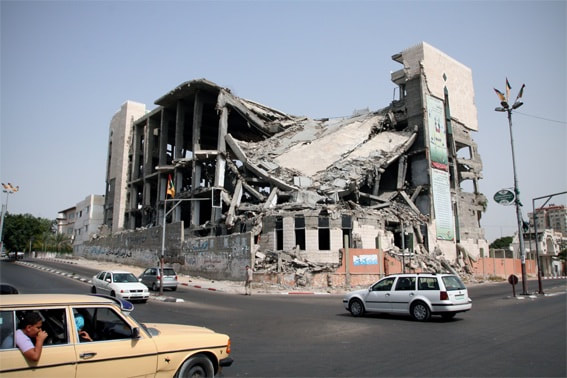|
Can I get away with saying out loud that I love both Israel and Palestine? Can I at least express a strong positive regard for the people of both countries? The short answer now is, “No”.
It is impossible to begin a discourse these days that mentions the historic suffering and current perils of both Israel and Palestine equally. The advocates of Israel will insist there is no valid comparison. The Holocaust was definitive proof that Israel is necessary, and unceasing hostility against Israel is proof that Israel must defend itself. This means there must be safe impermeable borders and complicit neighboring nations that refuse to tolerate aggression against Israel from within themselves. The advocates of Palestine, for their part, point out that their people have nowhere to live normally. They have been dispossessed, disenfranchised, rendered stateless in effect, and barely tolerated. Their rights have been affirmed by all sorts of international forums, but ignored in practice. Israel’s treatment of Palestinians amounts to ethnic cleansing and apartheid, unparalleled in our time. Even more telling, it is impossible to begin a discussion that mentions the flaws of either Israel or Palestine. Any hint that Israel’s policies and practices are even questionable, almost immediately deteriorates into name-calling. The other day a British newspaper reported that Israeli authorities had removed a solar electric facility built with Dutch money for a Palestinian village. The article left the impression that the solar cells were stolen and the other equipment destroyed in behalf of the Zionists. The rebuttal comments to the article had nothing to do with the factuality of the report, but excoriated the news bureau as anti-Semitic and retorted that Jewish settlers had a right to defend themselves. No comment tried to explain how the use of solar power by that village to replace their malfunctioning diesel generators that only worked 3 hours a day was a security threat to the new Jewish settlers who had illegally built nearby. It was the report that was what ought not to have happened. The point is that criticism of Zionist action is not tolerated. On the other hand, to see how aggravating it is to pro-Palestinians to have Palestinian flaws pointed out, such as their attacks and violence with rocks and rockets, we would have to have access to Arabic language news sources. It may be that such sources are somewhat easier to get here in Thailand than in the USA, but, trust me, Palestine’s friends do not like criticism any more than Israel’s friends do. Going back to 1948 when the United Nations voted to validate the State of Israel, the international solution is that there should be a Palestinian state, too. Indeed, there is such a state and it is recognized by the United Nations. However, its territorial boundaries and structural integrity are still contentious issues. At the risk of over-simplifying history, I submit that two events have redefined the situation. (1) After twenty years, the 1967 war changed the military balance decisively. In one week Israel gained military control over the whole area from the Red Sea to the border with Syria. That included every bit of whatever might be Palestine. It was the Zionist dream come true of restoring the biblical borders of Israel from Dan to Beersheba. For the next 30 years Palestine was a matter in political flux with international efforts being made to seek a political solution that defined Palestine’s borders and ratified its national sovereignty. US President Jimmy Carter was almost successful at bringing that about. No matter what international tribunals have said, Israel is the military master of that territory. (2) The political balance within Israel itself changed from secular to religious when the Soviet Union collapsed and Russia began encouraging (rather than obstructing) Jewish emigration to Israel. The influx of ultra-religious settlers put pressure on Israel to accommodate them. Shortly their numbers added to the strength of the right-wing Likud political party and brought them to power, and thus effectively ended Palestinian hopes of resisting the erosion of their rights and even access to jobs and utilities. None of their land is safe from encroachment. Jewish settlements on Palestinian land have a high rate of being successful and protected. In the real world there usually are only two political forms these days, political obscurity and realpolitik. Both are hiding realities. The reality of justice for Palestine is obscured behind religious rhetoric from all directions. Out and out declaration of Israeli sovereignty over all its land would lead to unpredictable outrage, but incremental dismantling of Palestine seems to be working. [See the Wikipedia picture of the Palestinian Legislative Assembly building, destroyed by Israel in 2009]. Even symbolic impossibilities of a few years ago are becoming more likely, such as moving the US Embassy to Jerusalem, which would mean that the US no longer considers Jerusalem either neutral or divided – the whole city, Christian and Muslim holy sites and all, is Israel’s to have and to hold. But the other reality is the fate of Palestinian people. To say that they have a future in Israel is to ignore the things that are happening to them, which amount to a barely hidden effort to make their lives so unbearable that they will leave, as millions have already done and are now in refugee camps in Jordan or “settled” abroad. So here is reality: Israel has military sovereignty and Palestine has no military at all. Israel is solidly in the hands of its religious right-wing and Palestine does not exist for them. As long as outside powers are unwilling to risk unlimited war with each other, the matter rests with Israel and Palestine. In that case, there is only one realistic conclusion. Palestine is extinct.
0 Comments
Leave a Reply. |
AuthorRev. Dr. Kenneth Dobson posts his weekly reflections on this blog. Archives
March 2024
Categories |
| Ken Dobson's Queer Ruminations from Thailand |
|

 RSS Feed
RSS Feed
